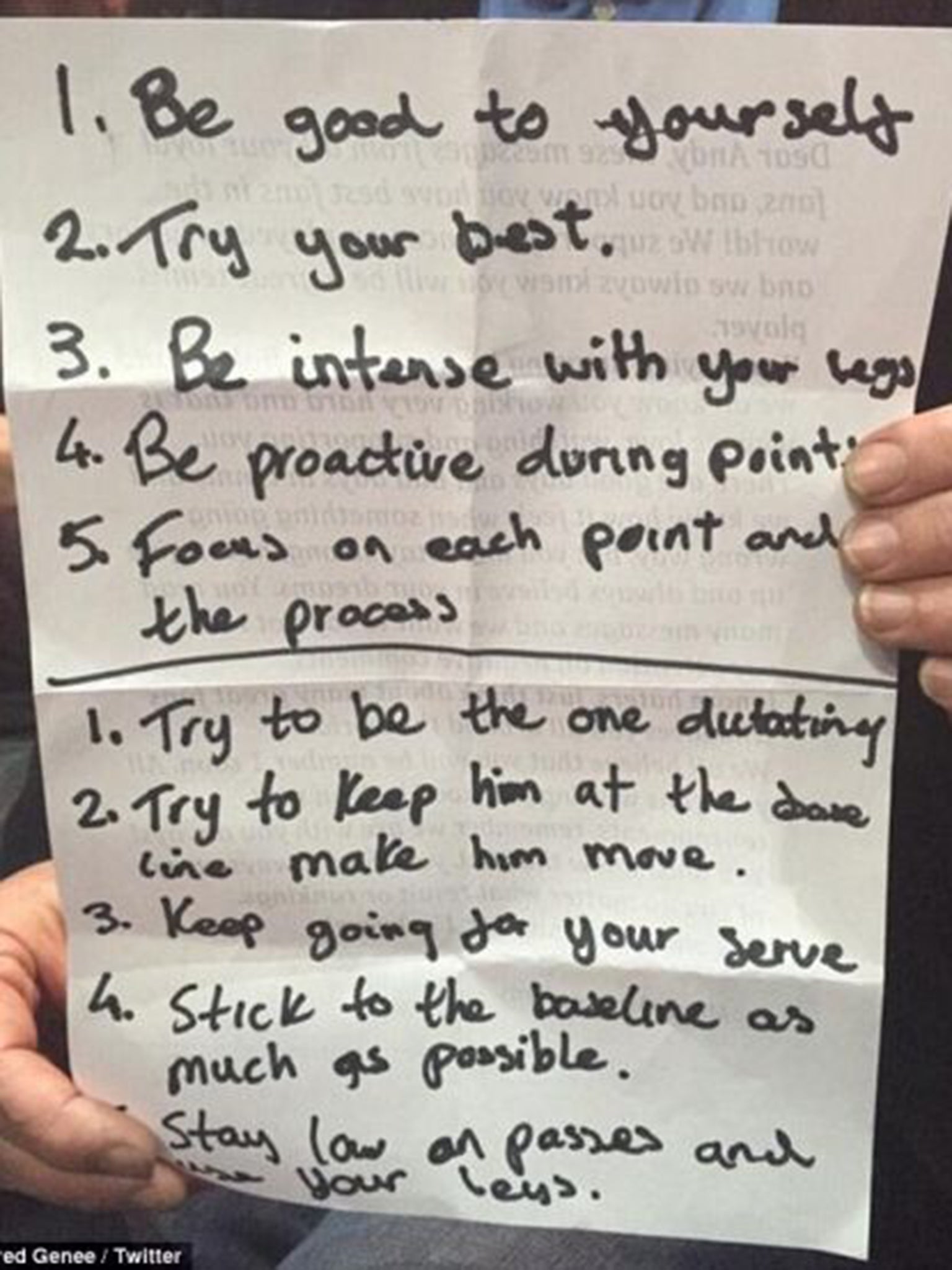What we can all learn from the 10 Commandments of Andy Murray
1. If you write motivational messages, try to follow them. 2. Don't leave list lying around

Given Andy Murray's mother's magnificent pastime of demolishing Yoko Ono's self-help insanity on Twitter, it would be intriguing to know what she makes of her son's now highly public 10-point plan for tennis success in Rotterdam this week.
Murray's page of bullet points remained either turned over or folded up throughout his defeat by the comparatively lowly ranked world number 19 Gilles Simon, until Dutch journalist Wilfred Genee nabbed it, photographed it and tweeted it, revealing 10 fundamental truths that evidently did their owner – or perhaps author – very little good indeed.
1. Be good to yourself, reads the first one, a slogan more usually associated with a range of Sainsbury's meals, which ironically would be valuable advice for almost every living Scotsman besides this one. If this is indeed a reminder to pop to the supermarket on the way home, putting it at the top and not the bottom of the list is just naive.
2. Try your best. Mere mortals might think this obvious. Can't be arsedness is a common affliction in the human condition, but it doesn't usually manifest itself in two-time Grand Slam tennis champions. That said, those who saw his decision to essentially stop contesting the final two sets of the Australian Open final, played last month, will know that such brisk, brutal instruction might be just what he needs.
3. Be intense with your legs. It's unlikely Murray's 10 Commandments will gain quite as much traction as their biblical counterparts, but if they do, this will be the mildly suggestive, coveting your neighbour's ass equivalent. Whatever it means, isn't it a line from Zoolander?
4. Be proactive during points. It's hard to see how this differs greatly from point two. At some moment, in most points, it will be Mr Murray's job to hit the winning shot, for which proactivity could be considered essential.

5. Focus on each point and the process. From the footballer's media training manual. Just take each point/game as it comes. Until now we all thought such platitudes were just what these people said to the press.
6. Try to be the one dictating. "Reach for the stars and you might end up in the clouds," goes the old idiom – ie, aim low and you'll just end up even lower. So there is much to be admired in "trying to be the one dictating". Hitler's diaries are alas lost to history and Kim Jong Un keeps his cards close to his chest, but you have to doubt whether those who do end up dictating write themselves notes about trying to do so.
7. Try to keep him at the baseline, make him move. Though the game has changed profoundly in the past five years, traditionally, in tennis, the way to keep the opponent at the baseline is to come to the net. This might indeed be a propitious tactic against the likes of Mr Simon – yet see point nine.
8. Keep going for your serve. It has always been a rarity, in tennis, for the player with the highest percentage of first serves in, to lose; so trying as hard as you can to hit your serves in is a cunning ploy. Nonetheless, it is hard to imagine Federer, Nadal, Djokovic, Jeremy Bates or even Miss Joan Hunter Dunn in the old John Betjeman poem extracting much benefit from a handwritten note reminding them to do so.
9. Stick to the baseline as much as possible. As has been mentioned above, tennis is a different game now. Everyone sticks to the baseline. But Murray didn't lose the game through reckless venturing forward. He lost it through a lack of application in points two, four, five, six and eight.
10. Stay low on passes and use your legs. Some much needed simple technical advice to end with, but again, this can only kick after points two, four, five, six, seven, eight and nine have been addressed successfully. Which, given the result, we have to conclude they weren't.
Join our commenting forum
Join thought-provoking conversations, follow other Independent readers and see their replies
Comments
Bookmark popover
Removed from bookmarks